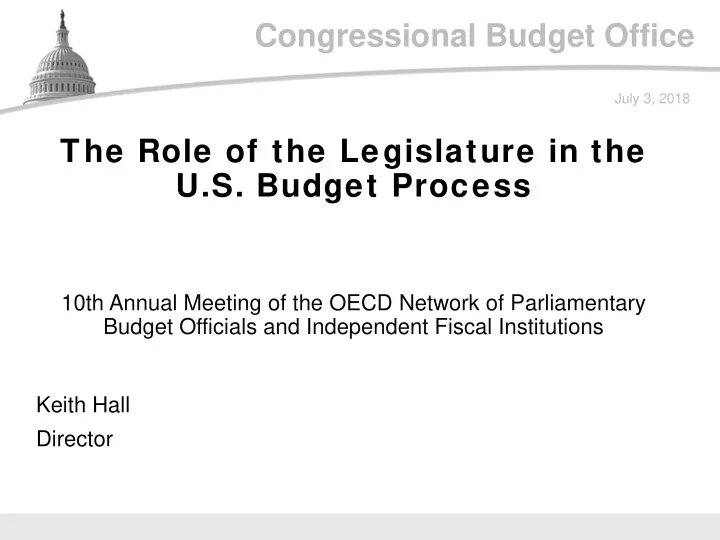

Congressional Budget Office July 3, 2018 The Role of the Legislature in the U.S. Budget Process 10th Annual Meeting of the OECD Network of Parliamentary Budget Officials and Independent Fiscal Institutions Keith Hall Director
CBO The Congress’s Share of the Budget Process The Constitution places the power of the purse with the Congress, which is the government’s legislative branch. Article 1 states: “No Money shall be drawn from the Treasury, but in Consequence of Appropriations made by Law . . .” The Congress passes legislation, including decisions about taxes and spending (although the President must agree for it to become law). 1
CBO The President’s Share of the Budget Process The President, who heads the government’s executive branch, is required to submit an annual budget, but that is merely a statement of proposed priorities. The Congress may or may not consider some of those proposals. The President can veto spending bills or tax legislation (although the Congress can override the veto). The President implements budget decisions. 2
CBO No Single Document Constitutes the Federal Budget Just as the President submits a budget proposal annually, the Congress sets priorities in a budget blueprint known as the budget resolution. The Congress also enacts multiple pieces of legislation to Authorize or reauthorize programs, Change federal tax laws, and Provide funding for federal programs. All of those enacted laws are what constitutes the budget. 3
CBO Most of the Budget Does Not Require Annual Legislative Action Percent Mandatory Spending Discretionary Spending Discretionary Spending 4
CBO The Process of Considering the Budget Is Complicated Many laws, rules, and procedures affect the proposal and consideration of spending and tax legislation. They have been developed over time. Their form varies according to circumstances. Interpreting and applying them can be difficult. 5
CBO Legislation Governing the Budget Process The Congressional Budget and Impoundment Control Act of 1974 Enhanced and centralized budgetary capacity in the Congress, Created institutions to manage the process (the budget committees and CBO), and Established the practice of creating a budget resolution. Subsequent legislation has tried to find enforcement mechanisms that work by Focusing efforts on specific amounts of deficit reduction; Establishing, restructuring, and reinstituting control; and Providing incentives for the Congress to act. 6
CBO What Have Those Repeated Attempts at Setting Fiscal Rules Taught Us? Fiscal rules are better at enforcing deficit reduction agreements already in place than at forcing such agreements to be reached. Budget procedures that highlight and penalize deviations from agreements can be helpful, but they work only to the extent that lawmakers choose to enforce them. Broad fiscal targets have not been effective as a stand-alone substitute for specific policy measures. 7
CBO The Timeline of the Budget Process, as Envisioned by Law 8
CBO Appropriations Have Been Late and Are Getting Later FY = fiscal year. 9
CBO Common Criticisms of the Budget Process It has not produced Late enactment means that sustainable outcomes. annual appropriations are late, which Its scoring rules and practices Leads to shutdowns and are complex. They Makes it harder for agencies Are often manipulated, to plan. Invite gimmicks, and It does not foster Drive the process. compromise. No minority Members have It often is not finished in time. voted for the budget resolution There has been no budget since 2008, and resolution 10 times since 1974, and No budget resolution has received more than a handful Five consecutive years passed of minority votes since 1997. without a budget resolution between 2010 and 2014. 10
CBO Federal Debt Held by the Public Is Projected to Rise From an Amount Equaling 78 Percent of GDP to 96 Percent of GDP 11
Recommend
More recommend